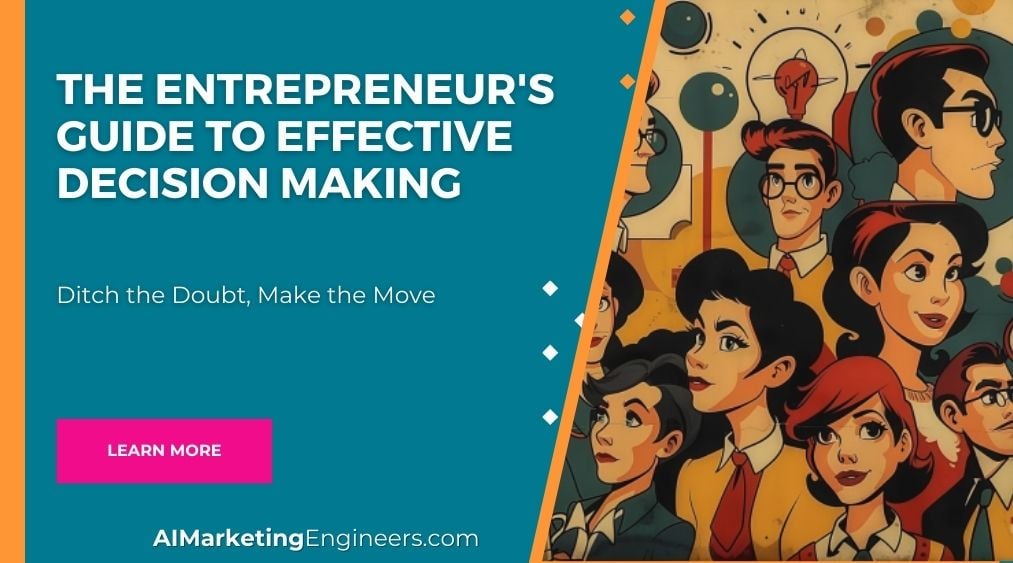Key Takeaways
✅Embrace the Big Picture and Avoid Analysis Paralysis: Align decisions with your business' overall goals. Set a deadline for information gathering and avoid overanalyzing, which can stall progress.
✅Leverage Data, Intuition, and Diverse Perspectives: Use analytics for objective decision-making. Combine data with gut feelings and consult with your team to gain broader insights.
✅Cultivate Resilience and Practice Consistency: Learn from failures to strengthen decision-making. Consistent choices build trust and credibility within your team.
Introduction
What sets successful entrepreneurs apart when making critical decisions? Effective decision-making can make or break a business, especially in fast-paced environments. The Entrepreneur's Guide to Effective Decision Making offers valuable insights into harnessing the power of data and intuition while fostering resilience. By setting SMART goals, managing cash flows, and prioritizing customer experience, entrepreneurs can achieve optimal results. In this article, we'll explore innovative perspectives and modern trends that can transform your approach, driving higher revenue and ROI. Stay with us to uncover actionable strategies for your entrepreneurial journey.
Top Statistics
| Statistic | Insight |
|---|---|
| Blending Data and Intuition: Balancing data-driven insights with intuition is crucial for effective decision-making, allowing entrepreneurs to see beyond the numbers and make informed choices. | Balancing these two aspects is essential because it ensures that decisions are not just based on cold numbers but also on the entrepreneur's experience and feel for the market. |
| Data-Driven Decisions: Data-driven decisions are powerful. Leveraging data and technology can inform choices by tracking market trends, customer behaviors, and industry benchmarks. | Using data and technology helps entrepreneurs make decisions that are backed by real-world evidence, reducing uncertainty and guiding more precise strategies. |
| Avoiding Analysis Paralysis: It is essential to strike a balance between analysis and action, setting a reasonable time frame for gathering information to avoid analysis paralysis. | This ensures that entrepreneurs do not get stuck in endless data review and instead take timely actions based on sufficient information. |
| Cultivating Resilience: Embracing failure as a valuable learning experience can cultivate resilience and sharpen decision-making skills over time. | Failures are inevitable, but viewing them as learning opportunities can strengthen an entrepreneur's approach to future decisions. |
| Importance of Imagination: Imagination plays a vital role in entrepreneurial decisions, serving as a blueprint for the future, dependent on the entrepreneur's choices. | Imagination allows entrepreneurs to envision new possibilities and create innovative solutions that may not be immediately apparent through data alone. |
Setting SMART Goals
Setting SMART goals is crucial for any entrepreneur aiming for success. These goals should be specific, addressing clear outcomes. Goals must be measurable, allowing you to track progress objectively. Ensure your goals are achievable—ambitious but realistic. They should be relevant to your business’s overall mission and vision. Lastly, goals must be time-bound, providing deadlines to foster a sense of urgency.
Building a Strong Team
The backbone of any successful venture is a strong team. Surround yourself with individuals who excel in their fields and are passionate about growth. Don’t overlook the importance of listening to your team’s input. Their insights can be invaluable, providing diverse perspectives that lead to more well-rounded decisions.
Managing Cash Flow
Effective cash flow management can prevent many potential pitfalls. It’s essential to maintain a diligent approach to your finances, avoiding unnecessary risks. Being detail-oriented in your financial planning can help you steer clear of bad decisions that could jeopardize your business. Regularly review your financials to ensure you have a clear picture of your company’s economic health.

Staying Informed and Adapting
In an ever-changing business landscape, staying well-informed is a must. Keep up with industry news and trends to ensure your decisions are backed by the latest information. Engage in social listening to stay updated on your target audience's needs and preferences. Additionally, conduct competitor analysis to understand market dynamics and positioning.
Prioritizing Customer Experience
Customer experience should be at the heart of your business strategy. Offer unique benefits, such as exclusive products or personalized services, to make your customers feel valued. Ensuring excellent customer service and providing affordable shipping options can significantly boost customer retention rates. Remember, a happy customer is a repeat customer.
Measuring Results and Adjusting Strategies
How do you know if your strategies are working? By defining and tracking key performance indicators (KPIs). Regularly analyze these metrics to evaluate your progress and identify areas for adjustment. An agile business approach allows you to react to changes swiftly, ensuring you’re always in a position to capitalize on new opportunities. Being flexible and willing to adjust your strategies based on results can make a big difference in achieving your goals.
Each section of this guide offers practical advice, ensuring entrepreneurs can make informed and effective decisions. From setting clear goals to maintaining financial health, these steps provide a roadmap to creating a resilient and successful business.

AI Marketing Engineers Recommendation
Recommendation 1: Leverage Data Analytics for Decision-Making Accuracy: Data is the new gold. A report by McKinsey reveals that data-driven organizations are 23 times more likely to acquire customers, 6 times as likely to retain those customers, and 19 times as likely to be profitable. By integrating the principles from "The Entrepreneur's Guide to Effective Decision Making," you can harness data analytics tools like Google Analytics or Tableau to interpret vast amounts of consumer data. This enables you to make informed decisions that align with customer needs and market trends, ultimately boosting business growth.
Recommendation 2: Adopt Agile Methodologies to Enhance Responsiveness: Staying adaptable is crucial in today's fast-paced market. According to a survey by the Project Management Institute, 71% of organizations report using agile approaches for their projects. "The Entrepreneur's Guide to Effective Decision Making" advocates for flexibility in decision-making processes. Implementing agile methodologies like Scrum or Kanban can help you quickly pivot and adapt to market changes, ensuring you stay ahead of competitors and meet customer expectations effectively.
Recommendation 3: Utilize AI-Powered Tools for Enhanced Efficiency: Artificial Intelligence (AI) is transforming business operations. Gartner predicts that by 2025, AI will be integral to 90% of enterprise strategies and business models. Tools like IBM Watson or Salesforce Einstein can be critical in implementing the techniques discussed in "The Entrepreneur's Guide to Effective Decision Making." These AI tools can analyze complex datasets, predict outcomes, and provide actionable insights, allowing you to focus on strategic tasks and improve overall efficiency.
Relevant Links
- Discover the Essential Key Factors for Setting Impactful Campaign Goals
- How Personalized Campaigns Can Transform Your Marketing Efforts
- Master the Art of Revenue Tracking and Profit Analysis
- Unlock the Power of Ad Metrics for Campaign Analysis
- Maximize Customer Satisfaction with Top Customer Experience Strategies
Conclusion
In summary, "The Entrepreneur's Guide to Effective Decision Making" serves as a vital resource for any business leader aiming to steer their company towards success. By mastering the art of setting SMART goals, entrepreneurs can break down long-term visions into manageable steps that yield tangible results. Building a strong team ensures that decisions are fortified with diverse insights and expertise. A meticulous approach to managing cash flow equips leaders with the financial stability needed to avoid reckless risks.
Staying informed about industry trends and listening to customer needs helps in making decisions that are both timely and relevant. Prioritizing customer experience not only enhances satisfaction but also fosters loyalty and repeat business. Measuring results and being prepared to adjust strategies as needed ensures that goals remain within reach, even in a dynamic market landscape.
This guide isn't just about making decisions—it's about making effective decisions. As an entrepreneur, embracing these principles can be the difference between merely surviving and truly thriving. Are you ready to transform your decision-making process and propel your business forward?

FAQs
Question 1: What is the primary goal of effective decision making in entrepreneurship?
Answer: The primary goal is to make informed decisions that maximize the return on investment and increase the chances of business success.
Question 2: What are the key elements for business prosperity?
Answer: Key elements include a well-defined strategy, the right workforce talent, and organizational controls that foster performance without suppressing employee initiative.
Question 3: How do you evaluate the potential of a business idea?
Answer: Evaluate by asking questions such as: What problem are you solving? Is it big enough to matter? How do you measure success? Assess the market size and potential customer base to determine the best use of resources.
Question 3: What are the three essential questions to ask before making tough decisions?
Answer: The three questions are: Where am I running to? Am I making this decision from a place of fear or faith? Who must I become to lead into this decision? These questions help discern the motivations and outcomes of a decision.
Question 4: What strategies can be used to make the decision-making process more efficient?
Answer: Strategies include letting go of the need for perfection, combining intuition with expertise, creating value-based pros and cons lists, and using negative visualization to anticipate potential issues.
Question 5: How can you ensure you are addressing a real problem with your business idea?
Answer: Ensure you are addressing a real problem by understanding the needs and pain points of your potential customers and determining if your idea has the potential to become a thriving business.
Question 6: What is the importance of defining success before diving into a new opportunity?
Answer: Defining success is crucial because it provides a clear direction and helps measure progress. Set clear goals and timeframes to measure progress and adjust strategy as needed.
Question 7: How can you avoid decision paralysis?
Answer: Avoid decision paralysis by using techniques such as negative visualization, which helps identify potential issues in advance and removes fear of failure.
Question 8: What are the key considerations for charting a successful course for your venture?
Answer: Key considerations include determining where you want to go, how you will get there, and whether you can execute your strategy effectively. This involves clarifying objectives, developing a strategy, and ensuring you have the necessary resources and infrastructure.

Academic References
- Kahneman, D., & Tversky, A. (1979). Prospect Theory: An Analysis of Decision under Risk. Econometrica, 47(2), 263-291. This study explores differences in decision-making between entrepreneurs and managers in large organizations, highlighting the role of biases and heuristics in strategic decision-making.
- Sarasvathy, S. D. (2001). Causation and Effectuation: Toward a Theoretical Shift from Economic Inevitability to Entrepreneurial Contingency. Academy of Management Review, 26(2), 243-263. This book provides practical advice for entrepreneurs on managing risk and making effective decisions, covering topics such as marketing, financing, partnerships, and launching a business.









